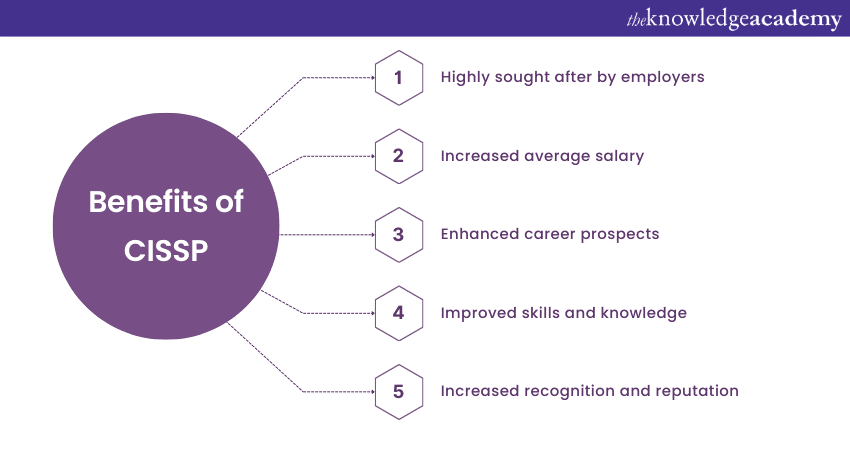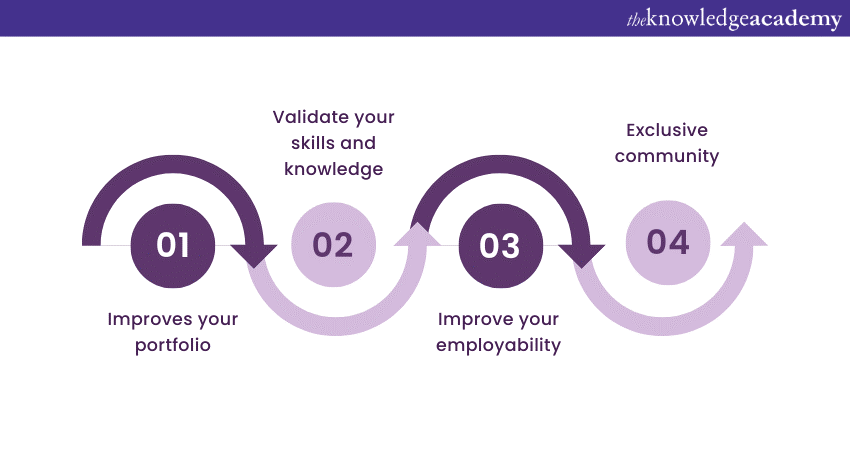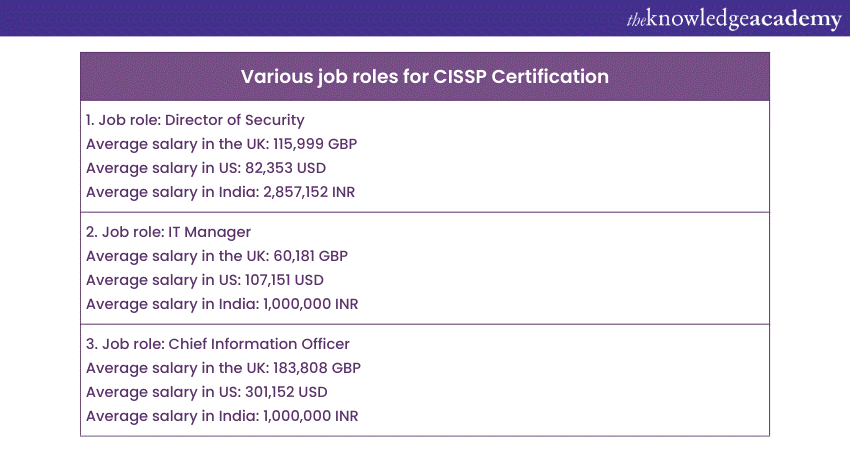We may not have the course you’re looking for. If you enquire or give us a call on 01344203999 and speak to our training experts, we may still be able to help with your training requirements.
Training Outcomes Within Your Budget!
We ensure quality, budget-alignment, and timely delivery by our expert instructors.

In today's world, things are moving rapidly, and keeping up with these changes is essential. When it comes to professions like Information Security and Cybersecurity, regular upskilling is essential. One of the popular Cyber Security certifications is the Certified Information System Security Professional (CISSP). It can help you upskill your skillset but Is CISSP Worth It in 2023? Let's find out.
The International Information System Security Certification Consortium (ISC)2 states, the average salary of a CISSP-certified professional in Europe is €75,703. Acquiring this certificate can help you get higher pay and benefits. Read this blog to learn what is CISSP and its benefits. This blog will answer your question Is CISSP Worth It?
Table of Contents
1) What is CISSP?
2) What are the benefits of getting a CISSP certification?
3) How to become a CISSP-certified professional?
4) Why is it worth it to pursue CISSP?
5) Conclusion
What is CISSP?
CISSP is one of the leading and sophisticated Cyber Security certifications. It is issued by (ISC)2, a non-profit global institute.
What is its purpose, and how can it help?
Its primary purpose is to test a person's knowledge and capabilities regarding information security. It thoroughly tests their ability to identify and handle security threats and risks and how they implement security measures. Here's how it can help businesses and professionals:
a) It helps increases the knowledge of information security professionals when it comes to safeguarding their organisation's data.
b) It provides guidelines and best practices which can be used to protect the organisation's information systems.
c) It helps businesses protect their online activities and reputation and implement the industry's best security standards
What are the benefits of getting a CISSP certification?

There are many benefits of getting a CISSP certification, besides the several opportunities for Information Security and Cyber Security professionals. You can capitalise on the increased demand by getting this qualification. CISSP Exam Cost typically include study materials, training courses, and the examination fee itself. Quality study materials and preparatory courses can be essential for success in the exam. The following are the key benefits of getting this qualification:
a) Widely recognised: Acquiring a CISSP certification validates your knowledge and skills for protecting information systems. It helps employers determine whether a person possesses the right skill set to safeguard the company's data and systems. Due to this, many organisations look to hire candidates who have valid qualifications like the CISSP.
b) High demand: Businesses are bombarded by new security threats and risks. Moreover, there is a significant shortage of Information Security professionals. So, there is a significant demand for these professionals in the job market.
c) High wages: Having CISSP significantly increase your earning potential because it is among the most sought-after qualifications. Due to the high demand, you are more likely to get high pay and be considered for salary raises. Even though CISSP and CISM certifications can increase your salary, the hike will not be as much as you expect, depending on your employer.
d) Competitive advantage: As recession looms ahead, organisations are looking for a short fix in the form of lay-offs. To add salt to the wounds, the emergence of Artificial Intelligence also poses a considerable threat to many jobs. People with limited skillset may get caught in this whirlwind and face negative consequences. This qualification will give you an edge and protect you from the brunt of this storm.
e) Accelerated growth: Acquiring this certification would certainly increase your career growth as well as your value. Besides, there is a huge shortage of skilled professionals in this domain. Combining factors like high demand and talent shortage, these professionals' future looks extremely promising.
f) Improved recognition: Acquiring this certification is extremely hard as you need to meet many requirements. These requirements include four years of work experience and clearing the CISP assessment. Moreover, you should get authorisation from an existing CISP holder who can vouch for your conduct and work ethic. So successfully acquiring this will give you recognition among peers and improve your reputation.
g) Improved knowledge: This certification covers many critical topics and will strengthen your fundamental understanding of Cybersecurity and other relevant CISSP Domains. It will expand your horizon in the CISSP domains. So, acquiring this certification will enhance your knowledge as well as impart the necessary wisdom when it comes to information security.
Signup for Information Systems Security Management Training and learn the best practices to mitigate security challenges and risks!
How to become a CISSP-certified professional?
Earning a CISSP certification has a lot of benefits; however, not everyone can qualify for it as you need to fulfil the eligibility requirements. It is a prestigious qualification highly regarded among professionals mainly due to its difficulty and rigorous eligibility requirements. Additionally, this underscores the importance of maintaining expertise through CISSP Renewal.
What are the requirements?
Passing the exam requires hands-on knowledge of Information Security principles and guidelines. Besides, you should possess technical expertise in planning, implementing and handling security measures of an organisation.
You need to fulfil work experience requirements to obtain the credential. Here are the CISSP certification requirements when it comes to experience.
Experience requirement
You should possess five years of paid and full-time work experience, particularly in at least two of the eight fields of the CISSP body of knowledge. You can substitute one year of work experience with a four-year college degree. These domains are listed below:
a) Software Development Security: It helps make sure that security measures are implemented well in advance during the early stages itself.
b) Security Architecture and Engineering: It involves different processes like designing security principles and models and implementing security measures.
c) Security Operations: It deals with how to execute the security plan and involves many processes, from identifying risks to managing threats.
d) Security and Risk Management: It involves implementing security policies to ensure confidentiality, integrity and availability.
e) Identity and Access Management: It helps control access of users and ensure that the right person has access to the right tools.
f) Security Assessment and Testing: It stresses the importance of creating, analysing and measuring the performance of security measures.
g) Communications and Network Security: It deals with how to create secure channels for organisational communication as well as protecting the network and its components from threats.
h) Asset Security: It deals with protecting the organisation's data and assets as well as its ownership and classification.
Who should pursue CISSP?
Anyone can pursue CISSP certification; however, Information Security professionals will benefit the most from it. But that doesn't mean only these professionals can benefit from it. So even if you are not an Information Security professional who wants to improve your career prospects, you can pursue this.
The principles and guidelines apply to various domains within Information Security and Cybersecurity. Everyone, from entry-level to senior-level professionals, can benefit from this certification.
Once you fulfil the eligibility requirements, you can pursue this certification. If you fail to meet the required experience, you can still apply, provided you can fulfil the experience requirement in the next five years. So, considering the benefits and wide application, anyone can pursue this qualification.
Why is it worth it to pursue CISSP?

Professionals with CISSP qualifications are some of the highly sought after globally. Having this qualification has a lot of benefits and will significantly boost your resume. From improved recognition to improved salary, it has many benefits. Acquiring this certification helps you showcase your knowledge and skillset to tackle any risks and threats.
Earning this certification is very difficult, as only a few individuals have earned it. By acquiring the certificate, you will become a member of an elite group that few people can access. Apart from this, it helps open up the door for many diverse roles and opportunities.
Job roles
One of the best things about acquiring this certification is that you can apply for various jobs and roles. Moreover, it helps boost your career and increase your chances of getting a promotion and higher salary.
The salary range can vary based on factors like your educational qualification, work experience, and performance. Moreover, it also varies on your job roles and responsibilities and where you work.
Although it doesn't give a one-size-fits-all solution, you can certainly use it to get ahead in your career. You become eligible for the following job roles after acquiring a CISSP certification:
a) Director of Security: This position is much higher up the ladder and is responsible for the organisational security strategy. It involves a lot of responsibilities like handling systems, instructing employers, creating visitor policies and examining for gaps in the security policy.
b) IT Manager: People in this position are primarily responsible for maintaining and overseeing an organisation's information systems and technology. They are also responsible for detecting risks and implementing strategies to overcome them.
c) Security Systems Engineer: They create, maintain and optimise security policies and strategies to protect an organisation's infrastructure. They also deal with any IT security-related issues that may arise. Moreover, they also deal with the security of applications and software and are responsible for overcoming technical issues.
d) Security Analyst: People in this position are responsible for designing and executing security strategies to safeguard an organisation's systems. Their responsibilities include conducting vulnerability and security assessments, and they should regularly test the systems to detect any weaknesses.
e) Security Manager: They are responsible for protecting an organisation's sensitive information, like intellectual property and other sensitive data. They are also responsible for managing the security of the information systems.
f) Security Architect: As the name implies, people working as an architect are responsible for building a sophisticated security strategy for computer security architecture and networks.
g) Security Consultant: Their primary responsibilities include analysing the existing security measures to identify potential risks of an organisation. Once they are done with their assessment, they are responsible for suggesting comprehensive security solutions to overcome the risks.
h) Network Architect: They are responsible for planning and building an organisation's networks like intranets and local area networks (LAN), etc.
i) Chief Information Officer: This is a high-level position and is primarily responsible for an organisation's data security. Their responsibilities include supervising the handling and execution of a business's computer systems and information technology. They are responsible for taking technological initiatives to achieve business growth.

Source: Glassdoor
Conclusion
We hope this blog answered your question - Is CISSP Worth It. Moreover, you would have also learned the advantages of this certification and how it helps you get ahead in your career. Getting this prestigious qualification has a lot of benefits, so without a doubt, it is worth it to pursue.
Gain deep insight on information security frameworks with Chief Information Security Officer Training and enhance your career opportunities - Signup now!
Frequently Asked Questions
Upcoming IT Security & Data Protection Resources Batches & Dates
Date
 CISSP Certification
CISSP Certification
Mon 4th Nov 2024
Sat 16th Nov 2024, Sun 17th Nov 2024
Mon 18th Nov 2024
Mon 2nd Dec 2024
Sat 14th Dec 2024, Sun 15th Dec 2024
Mon 16th Dec 2024
Mon 13th Jan 2025
Mon 10th Feb 2025
Mon 10th Mar 2025
Mon 7th Apr 2025
Mon 12th May 2025
Mon 9th Jun 2025
Mon 14th Jul 2025
Mon 11th Aug 2025
Mon 8th Sep 2025
Mon 13th Oct 2025
Mon 10th Nov 2025
Mon 8th Dec 2025







 Top Rated Course
Top Rated Course




 If you wish to make any changes to your course, please
If you wish to make any changes to your course, please


